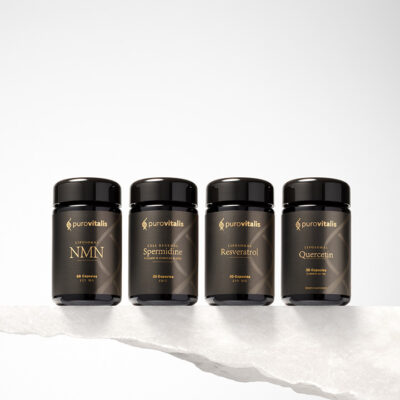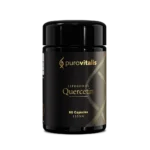
Sugar is a major part of modern diets, and scientific research confirms it actively accelerates aging at the cellular level. From skin elasticity to brain function, excess sugar consumption has been linked to processes that contribute to premature aging. This blog explores the scientific evidence on how sugar affects aging and provides insights into why reducing sugar intake may support longevity and overall health.
What is sugar?
When we talk about sugar, most people think of white table sugar, but sugar is in almost everything we eat. It’s a carbohydrate that gives the body energy and naturally exists in fruits, vegetables, dairy, and whole grains. But sugar is also added to many processed foods, often as sucrose, fructose, and glucose.
No matter where it comes from, the body breaks sugar down into glucose, which enters the bloodstream. When this happens, the pancreas releases insulin, to help the cells absorb and use glucose for energy. But when we consume too much sugar too often, this system gets overwhelmed. Over time, the body can struggle to manage blood sugar properly, increasing the risk of metabolic imbalances and long-term health issues.
What happens when the body has excess sugar?
If the body has more glucose than it needs, two things happen:
Short-term storage: Excess glucose is converted into glycogen and stored in the muscles and liver for later use, such as during fasting or physical activity.
Long-term storage: Once glycogen stores are full, the body converts the excess sugar into fat, which accumulates in adipose tissue, particularly around the abdomen and liver.
Over time, consistently high sugar intake can lead to metabolic disturbances and contribute to premature aging.
Sugar and glycation
Glycation is a chemical reaction where sugar molecules bind to proteins, forming harmful compounds known as Advanced Glycation End-products (AGEs). These molecules accumulate in the body’s tissues and contribute to aging by damaging cells, reducing skin elasticity, and increasing inflammation.
Consequences of glycation:
Skin: Glycation stiffens collagen and elastin, leading to wrinkles and sagging skin.
Blood vessels: AGEs damage blood vessel structures, increasing the risk of cardiovascular disease.
Nervous system: Accumulation of AGEs in the brain has been linked to neurodegenerative diseases such as Alzheimer’s.
Research from the Leibniz Institute for Aging Research (2022) found that AGEs, harmful compounds formed when sugar binds to proteins, tend to build up in parts of the body that don’t regenerate quickly, like skin and cartilage. This leads to stiffness, weaker tissues, and an overall decline in function. Another study published in Aging and Disease (2018) showed that glycation damages not just proteins but also DNA and fats in the body. This damage raises the risk of serious conditions like diabetes, heart disease, and neurodegenerative disorders such as Alzheimer’s.
Sugar and inflammation
Chronic high blood sugar levels can contribute to persistent low-grade inflammation, also known as ‘inflammaging‘. Research published in IUBMB Life (2017) showed that high glucose levels modify proteins on the surface of endothelial cells, triggering an immune response and promoting inflammation. Elevated blood sugar also increases oxidative stress, further accelerating cellular aging.
You might also find this blog interesting: Quercetin and inflammation: exploring the possibilities.
Sugar and mitochondria
A high sugar intake can harm mitochondria, the cell’s energy producers, and accelerate aging. When blood sugar levels remain consistently high, the risk of insulin resistance, inflammation, and oxidative stress increases, putting strain on mitochondria(4).
Mitochondrial dysfunction is a key factor in aging and age-related diseases. Damage to mitochondrial DNA reduces energy production, leading to faster cellular deterioration and increased vulnerability to oxidative stress (5).
Mitophagy is the mitochondria’s self-cleaning process, recycling damaged parts to keep cells healthy. This prevents defective mitochondria from accumulating, slowing aging and reducing disease risk.
To learn more about mitochondrial health, read our blog post: Understand Mitophagy.
Sugar and telomeres
High sugar consumption has been linked to accelerated telomere shortening, a key marker of aging. Telomeres, the protective caps at the ends of chromosomes, naturally shorten over time, but excessive sugar intake may speed up this process, increasing the risk of age-related diseases. A study published in BMC Public Health (2025) found that frequent consumption of sugar-sweetened beverages was associated with faster biological aging, as measured by telomere length.
Related: The Hallmarks of aging
Sugar and brain aging
Too much sugar can also speed up brain aging. A study in The Journals of Gerontology found that people who consume a lot of sugar, especially from sugary drinks, tend to perform worse on memory tests. Research published in NY Post has also found that communities with low sugar consumption, like the Tsimané people of the Bolivian Amazon, have lower rates of dementia. Their diet is naturally rich in fiber and essential nutrients while being low in sugar and unhealthy fats.
What do experts say about sugar and aging?
Dr. Robert Lustig, a leading researcher in sugar metabolism, argues in his books “Fat Chance” and “Metabolical” that sugar is a primary driver of metabolic dysfunction and accelerated aging. He emphasizes that fructose, in particular, overwhelms the liver, leading to increased fat storage, insulin resistance, and systemic inflammation, all of which contribute to premature aging.
Jessie Inchauspé, also known as the Glucose Goddess, explores how stabilizing blood sugar levels can optimize energy, mood, and longevity. Read more in our blog: Glucose Goddess hacks: Master blood sugar for health and longevity.
How to reduce sugar intake for healthy aging
Now that we understand how sugar accelerates aging—both internally and externally—you might be wondering: how can I minimize sugar in my daily life? The next time you’re at the supermarket and want to avoid unnecessary sugar, keep an eye out for the following:
- Hidden sugars: Check ingredient lists for terms like glucose syrup, fructose, maltose, and dextrose.
- Sugar-sweetened beverages: Avoid sodas, fruit juices, and energy drinks that are loaded with sugar.
- Processed foods: Many packaged foods contain lots of added sugar, even in unexpected items like bread, sauces, and dressings.
General tips for reducing sugar
- Drink water, herbal tea, or unsweetened drinks instead of sugary beverages.
- Choose fresh fruit over processed sweets.
- Cook meals from scratch to control sugar content.
- Use spices like cinnamon or vanilla to enhance sweetness without sugar.
Final thoughts
The small changes you make today can have a lasting impact on your health. A recent 2024 study in JAMA Network Open confirmed that reducing sugar intake significantly improves metabolic health and lowers the risk of age-related diseases. Even small reductions in daily sugar consumption can lead to long-term health benefits. By making mindful choices and cutting back on sugar, you actively support healthier aging and overall well-being.
References:
1.Di Sanzo, S., Spengler, K., Leheis, A., Kirkpatrick, J. M., Rändler, T. L., Baldensperger, T., Dau, T., Henning, C., Parca, L., Marx, C., Wang, Z. Q., Glomb, M. A., Ori, A., & Heller, R. (2021). Mapping protein carboxymethylation sites provides insights into their role in proteostasis and cell proliferation. Nature Communications, 12(1), 6743. https://doi.org/10.1038/s41467-021-26982-6
2. Fournet, M., Bonté, F., & Desmoulière, A. (2018). Glycation Damage: A Possible Hub for Major Pathophysiological Disorders and Aging. Aging and Disease, 9(5), 880-900.
3. Hansen, N. W., Hansen, A. J., & Sams, A. (2017). The endothelial border to health: Mechanistic evidence of the hyperglycemic culprit of inflammatory disease acceleration. IUBMB Life, 69(3), 148–161. https://doi.org/10.1002/iub.1610
4. Diniz, M. S., Tocantins, C., Grilo, L. F., & Pereira, S. P. (2022). The Bitter Side of Sugar Consumption: A Mitochondrial Perspective on Diabetes Development. Diabetology, 3(4), 583-595. https://doi.org/10.3390/diabetology3040044
5. Liang, R., Zhu, L., Huang, Y., Chen, J., & Tang, Q. (2024). Mitochondria: Fundamental Characteristics, Challenges, and Impact on Aging. Biogerontology, 25, 923–941.
6. van der Rijt, S., Molenaars, M., McIntyre, R. L., Janssens, G. E., & Houtkooper, R. H. (2020). Integrating the Hallmarks of Aging Throughout the Tree of Life: A Focus on Mitochondrial Dysfunction. Frontiers in Cell and Developmental Biology, 8. https://doi.org/10.3389/fcell.2020.594416
7. Xia, T., Yuan, Q., Zhang, Y., & Shan, G. (2025). The associations between the energy and timing of sugar-sweetened beverage intake and phenotypic age acceleration in U.S. adults: A cross-sectional survey of NHANES 2007–2010. BMC Public Health, 25, Article 88.
8. Tryon, M. S., Stanhope, K. L., Epel, E. S., Mason, A. E., Brown, R., Medici, V., Havel, P. J., & Laugero, K. D. (2015). Excessive Sugar Consumption May Be a Difficult Habit to Break: A View From the Brain and Body. The Journal of Clinical Endocrinology & Metabolism, 100(6), 2239–2247. https://doi.org/10.1210/jc.2014-4353
9. Beard, M. (2025, February 25). Bolivian community with just 1% dementia and the ‘healthiest hearts in the world’ follow this diet. New York Post. https://nypost.com/
10. Gonçalves, N. G., Suemoto, C. K., & Ferreira, N. V. (2023). Different Sources of Sugar Consumption and Cognitive Performance in Older Adults: Data From the National Health and Nutrition Examination Survey 2011–2014. The Journals of Gerontology: Series B, 78(4), 620–628. https://doi.org/10.1093/geronb/gbac186
11. Chiu, D. T., Hamlat, E. J., Zhang, J., Epel, E. S., Laraia, B. A., et al. (2024). Essential Nutrients, Added Sugar Intake, and Epigenetic Age in Midlife Black and White Women. JAMA Network Open, 7(7), e2422749. https://doi.org/10.1001/jamanetworkopen.2024.22749

premium supplements Liposomal Technology made in EU Third party lab tested
Experience life to its fullest because you deserve the best! Try Purovitalis supplements!













